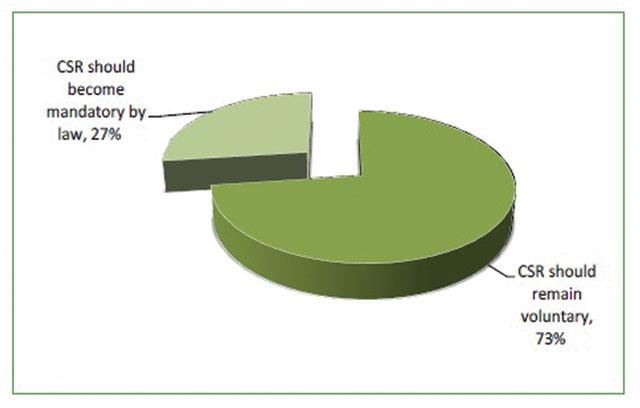You are here
‘Corporate social responsibility failing to deliver results; concept remains ambiguous to majority of CEOs’
By Laila Azzeh - Apr 28,2015 - Last updated at Apr 28,2015

AMMAN — Corporate Social Responsibility (CSR) is still "failing to deliver" in a country where economic challenges are getting more chronic and doubled by turmoil, according to economic experts.
A study conducted by the Vision Institute for Civil Society Studies last year showed that the majority of companies did not comprehend the concept of CSR, and were still lacking a systematic approach to integrate national, social, economic and environmental concerns into their business operations.
The study highlighted that more than two-thirds (67 per cent) of CEOs in the surveyed sample believed that CSR means abiding by the law, while a lower percentage of them believed it means giving out charity, while others said it is about serving the community or providing customer service.
As a result, the survey maintained that the concept of CSR remained "ambiguous" among the executive management of local businesses.
"It hit us that the majority of companies deem their commitment to the law as a form of social responsibility. Complying with the law is not a voluntary act," said May Al Taher, director of Vision Institute, in recent remarks to The Jordan Times.
The study also showed that companies confuse social responsibility with charity, which is another misconception, according to Taher, who explained that philanthropy is part of CSR, but there is a "broader" sense of the term related to development.
Moreover, the survey, which included a random sample of 270 companies operating in 11 different sectors, revealed that the overwhelming majority of CSR activities were carried out in the capital; 79.3 per cent in eastern Amman and 61.3 per cent in western Amman.
To this effect, the study urged Jordanian businesses to spread CSR programmes more fairly, taking into account poverty pockets that are in dire need of development efforts.
Zayyan Zawaneh, a prominent economist, underlined that companies do not have a deep-rooted understanding of the social responsibility philosophy and only carry out CSR activities to put on an act for publicity purposes.
"This is sad, particularly because challenges have multiplied after the influx of refugees," he told The Jordan Times, giving the shortage in school buildings as an example of ways companies can give back to society.
The study, funded by the embassy of the Netherlands in Jordan and published in cooperation with the Jordanian Forum for Economic Policies, showed that about half of the surveyed companies include CSR in their vision, goals and mission.
On the other hand, a lower number of companies said they incorporate such responsibility in their corporate plan and philosophy.
“It is vital to urge companies to incorporate CSR in their mission statement, vision or philosophy. This would reflect a more advanced and institutionalised business practice,” according to the survey.
The interviewed companies also indicated that they carry out the majority of their social activities in the area of poverty alleviation, which ranked in first place, followed by education, community development and health.
However, areas such as environmental protection and unemployment reduction weighed as less important by companies along with sponsoring sports teams, arts, talents, and TV and radio programmes.
“Companies usually look for sectors that are supported by Royal initiatives and rarely play the pioneering role when it comes to selecting the areas in need of support,” Taher charged.
Although the corporations revealed that they prefer to reach out to their target group through an intermediary or an executive partner — ideally a civil society or non-governmental organisation — two-thirds of the companies, or 65 per cent, said CSR priorities are solely identified by the CEOs.
“As I call for institutionalising the social responsibility obligations for companies, I urge such activities to be carried out away from the government and with the help of an intermediary that is aware of local needs,” Zawaneh suggested.
Encouraging a more systematic approach to CSR, economic expert Mazen Irsheid recommended establishing an independent entity to be responsible for monitoring companies’ social responsibility programmes.
“By this, companies can be given privileges based on their CSR activities,” he recently told The Jordan Times.
According to the said study, 35 per cent of the companies supported the establishment of a governmental CSR entity while 73 per cent wanted the entity to be independent.
As for the challenges, fluctuations in corporate profits came at the top of obstacles hindering CSR practices, followed by the high cost of such projects, the absence of government incentives, lack of tax exemptions and duplication in CSR initiatives.
Notably, 11 per cent of the interviewed companies reported that they have no intention of developing their CSR practices, while 27 per cent of them expressed their wish that CSR would become mandatory by law.
The study recommended calling on chambers of industry and commerce to instil the culture of CSR among the business sector, while encouraging corporations to cooperate with civil society and non-government organisations among other suggestions.
“It is also important to include employees in CSR programmes and not restricting such activities to the managerial level. This would entrench a CSR culture as an essential part of the wider corporate culture,” Taher said.
Related Articles
AMMAN — There is a gap between international best practices governing corporate social responsibility (CSR) and the degree to which concerne
AMMAN — A new study recommends enacting legislation that obliges corporations to exercise corporate social responsibility (CSR) by allocatin
As spending on corporate social responsibility (CSR) in Jordan ranges from JD60 million to JD90 million per year, MPs and company representatives in Jordan on Tuesday launched a consultation body to ensure efficiency and avoid duplication in projects.











